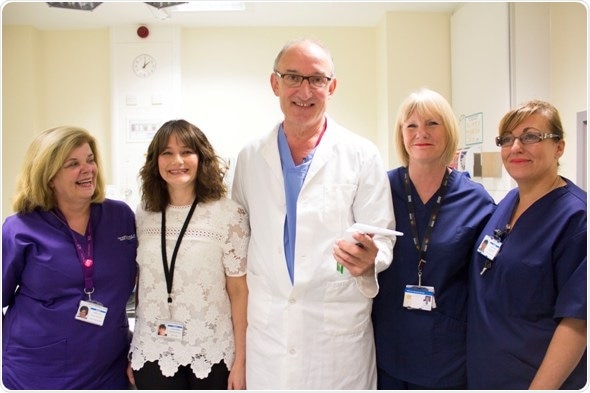Two hospitals in Staffordshire have introduced a pioneering new technology designed to improve the speed and accuracy in diagnosing pre-cancerous conditions of the cervix.

The team UHNM NHS Trust who will be using ZedScan. Consultant Gynaecologist, Charles Redman is pictured in the middle holding ZedScan.
The University Hospitals of North Midlands NHS Trust have adopted an innovative cervical cancer diagnostic system called ZedScan™ at the gynaecology departments at both the Royal Stoke University Hospital and County Hospital Stafford. Its aim is to offer a more accurate diagnosis for women who are at risk of cervical cancer.
ZedScan is a portable, handheld device that can measure and detect tissue changes in women identified with an abnormal smear test.
The system offers real-time and more accurate detection of pre-cancerous cells than standard colposcopy (a procedure for examining the cervix), enabling clinicians to make better informed decisions at a patient’s first visit.
This means that appropriate treatment can be offered immediately to women identified with severe abnormalities, or reassurance swiftly provided to patients with no evidence of disease, whilst also reducing the number of biopsies required.
Consultant Gynaecologist, Charles Redman, also President of the European Federation for Colposcopy, said:
We are delighted to be using ZedScan as it is very much the tool of the future.
It is extremely easy to use and improves colposcopy practice making our examinations more accurate and reliable. For the hospital, it also helps to save valuable resources as fewer biopsies are needed and patients can be returned to normal screening much quicker. Patients also like it because it offers them that additional reassurance, so it is a win-win situation for everyone involved.
The technology behind the system was developed by Manchester company, Zilico Ltd, following a collaboration between Professor Brian Brown, a medical physicist at the University of Sheffield, and Professor John Tidy, a consultant gynaecological oncologist at Sheffield Teaching Hospitals NHS Foundation Trust.
The ZedScan system uses patented Electrical Impedance Spectroscopy (EIS) technology to detect dysplasia and cancer of the cervix. It consists of a portable handset, docking station, a single use sensor and software application.
The non-invasive device takes 10–12 readings around the cervix, which takes approximately 2 to 3 minutes. It analyses the underlying tissue structure that identifies disease allowing clinicians to make a more informed decision during the patient’s first examination.
Cervical cancer is caused by the persistent high-risk human papillomavirus (HPV) infection, which triggers changes in the cervical cells.
Although colposcopy is an important method in detecting high-grade CIN to prevent cervical cancer from developing, in practice, the procedure has not drastically changed over the last 90 years, and diagnosis depends on the subjective assessment by the clinician.
ZedScan has been developed to support this clinical need. It is a non-optical system which has been designed to supplement the standard colposcopy process and provide reassurance and confirmation for diagnosis. In many cases, the system also identifies any abnormalities that may have been missed by visual examination.
Rob Atkinson, Sales Director for DP Medical Systems, the company who will be supplying ZedScan to the Trust, said:
The University Hospitals of North Midlands NHS Trust’s is working hard to become a centre of excellence in the field of gynaecology, so we’re delighted that they felt it was important to include ZedScan as part of the Trust’s service.
With ZedScan’s better clinical outcomes and economic benefits, we are working with other NHS Trusts throughout the country to adopt ZedScan in to their cervical cancer care pathway.